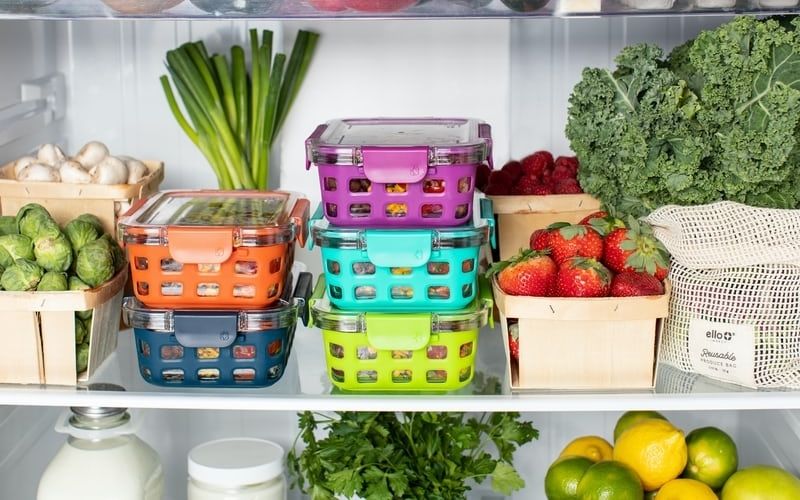What Are Freezer Food Storage Containers?
Frozen food and freezer food storage containers are vital necessities in the fooding industry in today’s standards. Frozen vegetables, ready-to-heat microwavable meals and varying standards of ice cream have grown astronomically since the first credited account of frozen food in 1953. With this in mind,, this article will discuss:
- Reasons why freezing your food is beneficial
- What products help assist the storage of frozen food
- Miscellaneous freezing tips
- Final considerations

Reasons Why Freezing Your Food Is Beneficial:
Saves Money
Freezing food and placing it in freezer food storage containers is beneficial because it can save you a lot of money in the long term. Freezing allows you to capitalise on buying local foods from supermarkets when they are at their most affordable price and storing them allows you to consume the food at a later date when you best see fit. Freezing food also helps you cut down on your travelling cost (so long as you buy food in large quantities) so in this sense, it will save you petrol as you can limit the amount of times you need to commute to get your groceries.
Reduces Waste
Another major benefit of freezing food is that It reduces food waste massively. For example, if you know for certain that you just can’t hack eating the last few mouthfuls of your veg, simply chop them up, freeze them and eat them at a later date. This can also synergise with saving you money as it will mean you will have to purchase less food or the week.
Prevents Microorganisms Developing
Freezing keeps foods safe by preventing microorganisms from growing and by slowing down the enzyme activity that causes food to spoil. As the water in the food freezes into ice crystals, it becomes unavailable to those microorganisms that need it for growth thus, improving the quality and safety of the frozen foods you eat.
What Products Help Assist The Storage Of Frozen Food
Below we have listed some of the most popular and perhaps less common assisting methods of storing frozen food.
Freezers
The most obvious product that helps assist the storage of frozen food is a freezer. Whether it be a 1 door 3 shelf freezer or a 2 door 6 shelf freezer, these nifty pieces of technology are the go-to method to store frozen food and come in many sizes, styles and additional components to help you with your storage needs.
Freezer Food Storage Containers
Freezer storage containers are an ideal way in which you can store your frozen food. If you have cooked a selection of pastas on the weekend to eat throughout the week, you will have difficulty placing it in the freezer without a container to store it in. by using these products, you can help organise your frozen food which is ideal for anyone especially if you someone who is constantly limited for time.
Leftover Takeaway Containers
A less common method that assists with your frozen food storage requirements is utilising takeaway containers. Lets face it, we have all ordered a takeaway at some point in our lives and some of you may be familiar with the plastic containers that your takeaway cuisine arrives in. These helpful packages are a great way to store food in your freezer as they are compact, easy to obtain and are reusable so you never have to worry about purchasing more plastic containers after each use.
Miscellaneous Freezing Tips
Below are some freezing tips which you should be aware of for safe application of freezing your food.
- Freezers should be kept at or below -18°C
- Using appropriate wrapping or packaging such as freezer bags and plastic containers will help protect your food and minimise the risk of you experiencing freezer burn – the process where food has been damaged by dehydration and oxidation due to air reaching the food.
- Freezing food when hot will raise the temperature of the freezer and could cause other foods to start defrosting which could affect the suitability to eat them.
- Freezing does not kill bacteria entirely. If you are unsure how long something has been frozen for, don’t take any chances and throw it away.
- Storage times for frozen foods differ depending on the type of food and type of freezer you have. Freezers typically have a star rating to let you know how long the food can safely be stored. Always check your freezer’s star rating as well as the instructions on the frozen food for guidance.
Final Points
Now that you are more aware of the importance of freezing food and utilising freezer food storage containers, it is time to debunk some of the common questions when it comes to freezing which can be detailed below:
Are There Foods That Should Not Be Frozen?
Freezing can damage some foods because the formation of ice crystals causes breakages of the food’s cell membrane. Although this poses no danger in terms of safety when eating the food, some edible items can lose their crispness as a result of the ice crystals. Examples of cuisine that do not tolerate too finely to freezing consist of salad vegetables and soft fruits.
How Long Can Food Be Kept In The Freezer?
Foods can be safely kept in the home freezer anywhere from 1 – 12 months without loss of quality depending on the food. The product label provides the best indication of how long the freezer food can be frozen for. Similarly, checking foods ‘use by’ dates will give you the best indication and help you decide hter you can store the food in a freezer safely.
